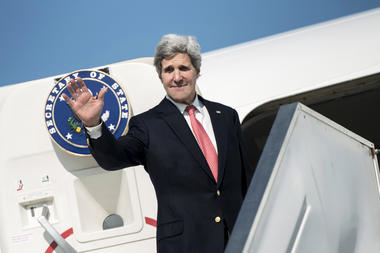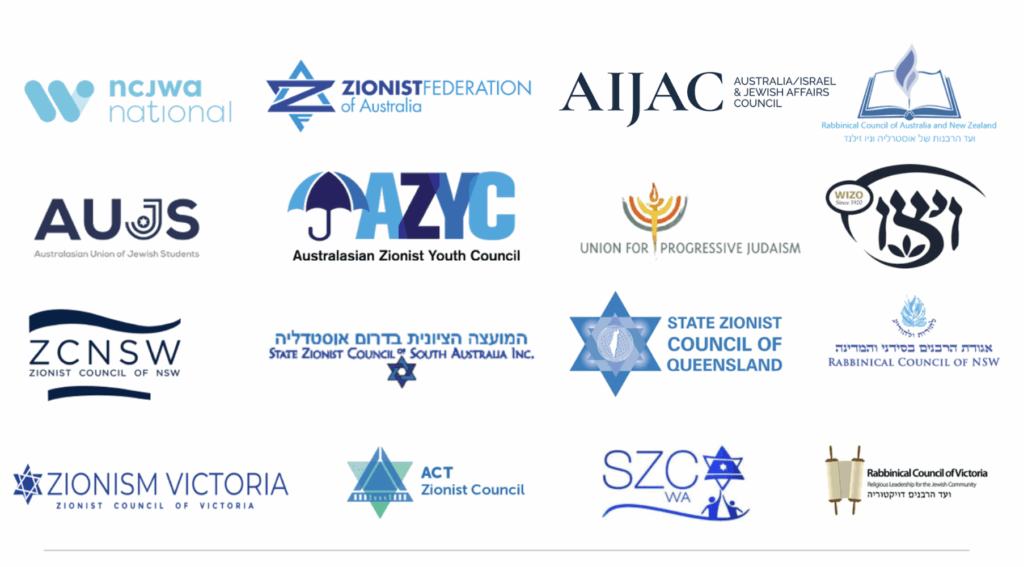UPDATES
Elements of a “Framework Agreement”
January 10, 2014

Update from AIJAC
January 10, 2014
Number 01/14 #01
With US Secretary of State John Kerry just having left the Mideast region Monday but expected to return next week, this Update looks at the prospects and some of the key issues for the “framework agreement” between Israel and the Palestinian Authority that he is reportedly working on to provide a basis for negotiations for both sides.
First up, veteran Palestinian Affairs reporter Khaled Abu Toameh discusses Palestinian Authority dissatisfaction with a number of key provisions of the proposed framework agreement as being proposed by Kerry – and how they appear to be tying their own hands to prevent compromise on these issues. In particular, they are doing this by seeking and receiving Arab League endorsement of the Palestinian position – particularly their rejection of any post-peace Israeli security presence in the Jordan valley. Abu Toameh explains the scope of the Palestinian rejection of Kerry’s ideas and the real difficulties he is going to have – post Arab League decision – in moving forward toward his framework agreement. For this analysis in full, CLICK HERE. Abu Toameh also commented on why Israeli Arabs reject land swaps which would see them living under Palestinian sovereignty.
Next, Ami Issacharoff of the Times of Israel looks in more detail into the Israeli-Palestinian disagreement on the question of the Jordan Valley – and especially the history of this issue in past peace negotiations. Issacharoff discusses an eight point security plan drawn up by then-Defence Minister Ehud Barak during the last major round of Israeli-Palestinian talks in 2007-2008 under the Olmert Government, which included an Israeli security presence in the Jordan Valley for an extended period after peace, but also some compromises Olmert later accepted. The piece also discusses the difficult tightrope the Jordanians are having to walk on this issue – feeling obliged to publicly support the Palestinian position, but very concerned about Palestinian security control of the valley. For his analysis in full, CLICK HERE. Meanwhile, blogger Kenneth Levin assembles strong evidence that the late Yitzhak Rabin also felt strongly that an Israeli security presence in the Jordan Valley was essential, post-peace. Offering a strong case for Israel’s need for the Jordan Valley are top Israeli academic security analyst (and recent visitor to Australia) Prof. Efraim Inbar and former Israeli national security advisor Uzi Dayan. In addition, Issacharoff has also explored how Palestinian red lines on a number of issues make a framework deal unlikely.
Finally, leading American political scientist Michael Curtis discusses another key Israeli-Palestinian disagreement – and one reportedly frustrating Kerry – the requirement that peace include a recognition of Israel as a homeland for the Jewish people. Curtis notes that the Palestinian rejection of this idea is essentially a rejection of something long recognised and accepted by both the United Nations and the international community more generally. He argues that, since the Palestinians base many of their own claims on UN resolutions – including particularly UNGA resolution 181, the 1947 partition resolution calling for two states – there is an inherent contradiction in the Palestinian approach which needs to be corrected for Kerry to succeed. For the rest of Curtis’ argument, CLICK HERE. Also offering good comments on why the issue of recognition of Israel as a state for the Jewish people matters are Liel Leibowitz of Tablet Magazine, former Israeli diplomat Zalman Shoval, Rick Richman of Commentary and Haaretz writer Avi Shilon.
Readers may also be interested in:
- Israeli Foreign Minister Avigdor Leiberman, generally regarded as a right-winger on Israeli-Palestinian issues, supports Kerry’s framework deal as the best deal Israel can expect to get.
- Israeli analyst Pincus Inbari analyses the differing Israeli and Palestinian approaches on borders – and growing evidence that Palestinians are considering asking for more than the “1967 borders” (actually armistice lines). Meanwhile, Israeli expert and former diplomat Dore Gold discusses how that once central UN Security Council Resolution 242 is being sidelined in current discussions.
- A detailed refutation of the claims often made about “Arab East Jerusalem”, with detailed history and facts about the city.
- Veteran US Middle East mediator Aaron David Miller offers his evaluation of Kerry’s prospects for getting the framework agreement he seeks.
- Hamas continues to put out statements rejecting the Israeli-Palestinian negotiations and denying Mahmoud Abbas’ right to negotiate on behalf of the Palestinians.
- The Israeli government is monitoring and calling attention to the ongoing problem of official incitement in the Palestinian Authority with Israeli PM Netanyahu highlighting this issue in his press conference with Kerry last week. Some prominent examples have been assembled in a presentation on the New York Times website.
- Stephen Flatow, whose daughter Aliza was murdered in a Palestinian terror attack, shows that Palestinian rock-throwing- often treated as an innocent form of “protest” – has killed more than a dozen Israelis.
- Elliot Abrams discusses the extensive role of Qatar’s Al-Jazeera network in promoting the idea that Arafat was poisoned with polonium – an idea now debunked by both French and Russian scientists who tested his remains.
- Turkish politics has been rocked by an increasingly acrimonious confrontation between Islamist PM Recep Tayyip Erdogan and his former allies associated with the powerful Gulen Islamist movement. Good analysis of what is going on comes from German-based Turkey expert Veli Sirin, scholar Harold Rhode, and columnist David Goldman (aka Spengler). Israel is of course being blamed for the turmoil by pro-Erdogan sources, while Erdogan’s son has allegedly been filmed meeting with an al-Qaeda financier.
- A good look at how the overall Middle East map changed in 2013 from Israeli strategic expert Dr. Jacque Neriah.
- Isi Leibler writes about the dangers of the increasingly extreme material being published by the left-leaning Israeli newspaper Haaretz, and calls for the Israeli government to develop a coherent and consistent policy on construction in West Bank settlements.
- Some examples from the many stories and comments now appearing at AIJAC’s daily “Fresh AIR” blog:
- Colin Rubenstein discusses the economic and political opportunities for Israel in Asia in the Jerusalem Post.
- Allon Lee lists some signs the interim nuclear deal with Iran may already be falling apart in The Canberra Times.
What the Palestinians and Arabs Think of Kerry’s New Ideas
It is hard to see how Abbas would be able to retract his position now that the Arab League has also rejected Kerry’s ideas. Kerry will now have to launch a new diplomatic campaign to convince the Arab League to change its position. And for the Arab countries to do that really would take a miracle.
The Palestinian Authority does not like U.S. Secretary of State John Kerry’s latest ideas for peace between the Palestinians and Israelis.
The Palestinians especially do not like Kerry’s proposal that Israel maintain a military presence in the Jordan Valley if and when a Palestinian state is established next to Israel.
Kerry, however, does not seem to be impressed with the Palestinians’ rejection of his ideas. He appears convinced that immense pressure on the Palestinians will eventually force them to succumb.
Palestinian Authority officials complained this week that Kerry is obviously not taking them seriously. “Although the Palestinian Authority leadership has turned down his ideas, Kerry continues to exert heavy pressure on us because he thinks he can impose his will on us,” remarked a senior Palestinian official in Ramallah. “Of course, Kerry is living in an illusion if he thinks we would change our position.”
Palestinian Authority President Mahmoud Abbas, who briefed Arab foreign ministers in Cairo on December 21, repeated his opposition to Kerry’s ideas. Before that, Abbas sent a letter to President Barack Obama expressing reservations about Kerry’s proposals.
Abbas has even won the backing of the Arab League for his stance. So it is not only the Palestinians who are now saying no to Kerry, but the Arab countries too. “The U.S. proposals achieved Israeli expansionist demands, and guaranteed [Israel’s] continued control of [the Jordan Valley] on the security pretext,” said a statement released by the Arab League.
Arab League Secretary-General Nabil al-Araby said that not one Israeli soldier could stay in the West Bank.
The Arab League’s position is a severe blow to Kerry’s ongoing efforts to persuade the Palestinian Authority to accept his ideas. Having won the backing of the Arab countries, Abbas now feels more confident to say no to Kerry and his proposals.
When Kerry next returns to the region, Abbas will once again tell him that he doesn’t accept his ideas, particularly in the wake of the Arab League’s having also rejected them.
Abbas, however, seems to have a problem not only with the idea of maintaining an Israeli military presence in the Jordan Valley.
A Palestinian official, who also said that Abbas had won backing from the Arab countries for his stance, revealed that Abbas continues to stick to his positions on a variety of issues pertaining to the Israeli-Palestinian conflict — positions that openly contadict most of the Israeli and American demands.
The official summed up Abbas’s position as follows:
- No to a demilitarized Palestinian state;
- No to recognizing Israel as a Jewish state;
- No to a solution that does not include all of east Jerusalem as the capital of a future Palestinian state;
- No to another interim agreement with Israel and, of course,
- No to the presence of any Israeli soldiers in the Jordan Valley.
The only two things that Abbas and the Arab League are prepared to accept is a timetable for an Israeli withdrawal to the pre-1967 lines that does not exceed three years, and an exchange of land “equal in size and value” with Israel in cases where Israel retains any land beyond the pre-1967 lines.
Until recently, the Palestinian rejection of Kerry’s ideas was expressed in a rather polite manner.
In the past few days, however, senior Palestinian Authority officials have begun launching a scathing attack on Kerry, with some accusing him of “endorsing” Israel’s position on most issues related to the conflict with Israel.
PLO Secretary-General Yasser Abed Rabbo said that Kerry’s proposals on security will lead to the “total failure” of the peace talks with Israel. Kerry’s ideas, he added, have provoked a “real crisis.” Abed Rabbo said that Kerry “only wants to win over the Israelis and [allow] settlement expansion at our expense.”
In an interview with Voice of Palestine radio, Abed Rabbo continued his unprecedented criticism of both Kerry and his proposals. “Washington does not have the right to determine where our borders would be,” he declared. “We won’t allow Israel to slice off any parts of our land. If the Americans want, they can give Israel parts of California and Washington. This land belongs to the Palestinians.”
The Arab League’s rejection of Kerry’s ideas not only complicates his efforts to achieve a deal between Palestinians and Israelis, but also ties Abbas’s hands. It is hard to see how Abbas would be able to retract his position now that the Arab League has also rejected Kerry’s ideas.
Kerry will now have to launch a new diplomatic campaign to convince the Arab League to change its position. And for the Arab countries to do that really would take a miracle.
Back to Top
————————————————————————
Just like his predecessors, Kerry finds trouble crossing the Jordan
Back when Bush and Rice were seeking a deal, Barak drew up an ‘Eight Point’ paper that kept the IDF in the Jordan Valley. Abbas said no. Now, Kerry is mired in the same dispute
Back to Top
————————————————————————
The Palestinians want to dance at two weddings
Palestinian leader Abbas can’t invoke the UN, which recognised Israel’s quintessentially Jewish character, while simultaneously using the UN to call for a Palestinian state without recognising Israel as a Jewish state. Peace depends on resolving this contradiction
Unfortunately, he has not. In late December 2013, Abbas, in rejecting the proposals of U.S. Secretary of State John Kerry for negotiating the Arab-Israeli conflict, is reported to have rejected the Israeli stipulation that Israel be recognized as “a Jewish state.”
Whatever Abbas’ own interpretation of the term “a Jewish state,” he is apparently unaware that the concept has been long recognized by the international community. It may be tiresome always to go back to square one of a disputed issue, yet it is vital to make the historical background clear and relevant.
In the Balfour Declaration of November 2, 1917 the British Government viewed with favor “the establishment in Palestine of a national home for the Jewish people.” The League of Nations Mandate for Palestine given to Britain on July 24, 1922 repeated this in exactly the same language.
These two particular documents might be called the engagement parties for which Abbas has little enthusiasm. However, he danced at the belated wedding reception of United Nations General Assembly Resolution 181(II) of November 29, 1947 adopted by a vote of 33 for, with 13 against, 10 abstentions, and one absent.
Abbas has apparently forgotten that Resolution 181, which the Arab states and Palestinians rejected at the time, called for the partition of the area into two states. It resolved, “Independent Arab and Jewish States, and the Special International Regime for the City of Jerusalem shall come into existence in Palestine.”
The Arabs of course did not establish their state, but the Representatives of the Jewish Community of Eretz-Israel and of the Zionist Movement did establish their state, which the United Nations had referred to as a Jewish state.
In Tel Aviv on May 14, 1948, the Members of the People’s Council “by virtue of our natural and historic right” and on the strength of the resolution of the UN General Assembly (181), declared the establishment of “a Jewish State in Eretz-Israel, to be known as the State of Israel.”
The United Nations had recognized the right of the Jewish people to establish a state. The reference to Israel as a Jewish State is integral to its very creation. That sovereign state, based on the right of self-determination, had referred to itself as Jewish State as the UN had done.
If Abbas sincerely wants a peaceful settlement with that state he should acknowledge its self-definition and the definition in Resolution 181 on which he bases his claim for a Palestinian state.
On September 23, 2011 Mahmoud Abbas submitted the application “of the state of Palestine” for admission to membership in the United Nations. Borrowing language used by the Zionist leaders in 1948 he submitted the application based, “on the Palestinian people’s natural, legal, and historic rights.”
But more important, he based his claim on the United Nations General Assembly Resolution 181 (II).
Abbas can’t dance at two weddings at the same time, nor can he have his cake and eat it. If he is declaring a Palestinian state based on Resolution 181, and if he genuinely wants a peaceful settlement, he must acknowledge the Jewish state called for in the Resolution.
The State of Israel is not changing its official name, even if it is, in the words of the Balfour Declaration, “a national home for the Jewish people.” It is totally different from the case with Muslim countries.
At least four countries — Afghanistan, Iran, Mauritania, Pakistan, — officially term themselves “Islamic Republics.” Even the Palestinian Basic Law of 2003 touches on the issue. Article 4 says, “Islam is the official religion in Palestine…Islamic Sharia shall be a principal source of legislation.”
Within Israel, and indeed in the world wide Jewish community, there are profound differences, political and religious, about the exact nature of a “Jewish State.”
However, all can agree that unlike the Islamic countries mentioned, the State of Israel is not, and will not become a theocracy; a form of government led by religious dignitaries on the basis of religious edicts. Law and tradition in Islamic countries are based on sharia law, religious law. Law in Israel, other than that concerning some personal issues, is secular, stemming from the Knesset and the courts of law.
It is unclear why Abbas has made the matter of definition of “Jewish State” such an important issue. It may be simply a device to prevent negotiations ever starting, let alone being concluded. His position in rejecting the Kerry peace proposals is really based on political differences and disputes about the historical narratives of the area.
It may be based on the fallacious supposition that Israel will disenfranchise the 1.6 million Israeli Arabs.
One can agree that those Arabs do not play as prominent a role in Israeli life as do their Jewish counterparts, and that changes need to be made. But it is wholly misleading and dishonest to suggest they are second class citizens who play no role and face discrimination, or that they would be expelled, or that they, whether Muslim or Christian, are not completely free to practice their religious beliefs.
Jewish religion and culture and tradition are not imposed on non-Jews. Has Abbas noticed that the deputy Speaker of the Israeli Knesset is Ahmed Tibi, founder of the Arab Movement for Change Party?
There are disputes about the history of the land. Palestinians are unwilling to accept the Jewish association with the land for three thousand years or that David established the kingdom of Israel. But these, though important elements in the Palestinian Narrative of Victimhood, are not pertinent to the present issue.
One can conclude there are really only two issues that prevent Abbas from being more forthcoming.
One is the problem, now 65 years old, of the Palestinians who in 1948-49 fled the area of what is now Israel. Abbas still holds that these refugees, whose flight was caused by the Arab invasion of the newly created state of Israel, have a “right to return” to their former homes.
The 2003 Palestinian Basic Law speaks of “national rights, the foremost of which are the right of return.” Objectively, it is difficult to accept that grandchildren and great grandchildren of those who fled have such a “right.” Nevertheless, Abbas may see that “right” abrogated if he accepts Israel as a Jewish state.
Even more important is the existential issue. The question of future borders of any future Palestinian state and the status of East Jerusalem are difficult to resolve but they are less important than the Arab refusal to accept the legitimacy of the state of Israel.
President Abbas, in his application to the UN in September 2011, did write of the “vision of two states living side by side in peace and security.” It is now up to him to try to implement this vision by accepting Kerry’s invitation and entering into the negotiating process seriously and without contradiction.
Michael Curtis, author of “Jews, Antisemitism, and the Middle East”, is Distinguished Professor Emeritus in political science at Rutgers University. Curtis, the author of 30 books, is widely respected as an authority on the Middle East.
Tags: Israel





